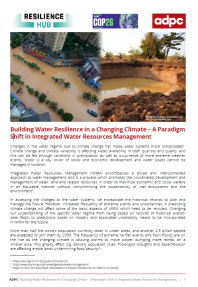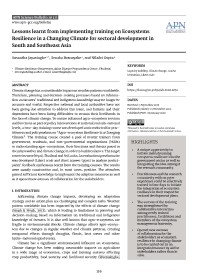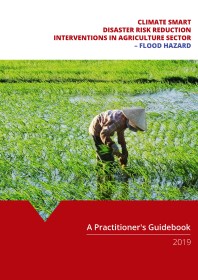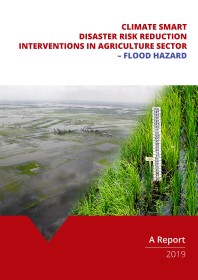- About Us
-
Who we are
-
- Publications
-
- ADPC Academy
-
MediaADPC'S NEWS
Field research and development center established in Nilwala basin in Sri Lanka Field research and development center established in Nilwala basin in Sri Lanka
19 Dec 2013
Palatuwa, Sri Lanka
The Agricultural Field Research Extension and Demonstration Center in Palatuwa’s Nilwala basin in Southern Sri Lanka was ceremonially opened on 19 December 2013 in the presence of ADPC’s Executive Director Prof. Dr. Krasae Chanawongse as the Chief Guest and Vice Chancellor of the University of Ruhuna Prof. Gamini Senanayake as the Guest of Honor.
The establishment of the center is part of the project called Mainstreaming Climate Information Application for Enhancement of Agro-Ecosystem Services and Functions in Nilwala basin in Sri Lanka and Lower Mekong basin in Vietnam. Launched in 2012, the project is implemented by Asian Disaster Preparedness Center (ADPC) in cooperation with the University of Ruhuna in Sri Lanka; Institution of Meteorology, Hydrology and Environment (IMHEN); and Cantho University Vietnam. The program is funded by the Australian Agency for International Development (AusAID).
The opening ceremony was followed by the project’s fourth management committee meeting chaired by Assistant Government Agent Matara. Also a field visit has been organized to observe the field research activities implemented under the project.
Working in close collaboration with the farmers
Through the establishment of the Field research and development center, the project aims to strengthen the local communities’ capacity to tackle the challenges related to climate change and associated natural disasters in particular drought, salinity, acidity and flooding.
“This is a unique project in which we have gotten into close collaboration with farmer communities and worked at their fields. We have established a model field center with the intension of increasing the interaction between the university researches and the farmer community,” said Prof. Dr. Chanawongse.
In the future, Prof. Dr. Chanawongse wished that the center will provide opportunities for learning and experience sharing, where students will attend skills development programs and learn from the farmer’s experiences. Recalling his long service as a community health worker and doctor serving in rural areas, Prof. Dr. Chanawongse stressed the importance of ADPC’s increasing engagement in community development to build resilience through undertaking interaction programs with communities in the future.
Vice Chancellor Prof. Gamini Senanayake stated that the program addresses the farmer’s grass-root level challenges in the downstream areas of the Nilwala basin which has been aggravated due to climate change impacts in the recent years. He further stated that the farmers have been confronted with a number of challenges associated with rice farming after the implementation of the Nilwala flood protection scheme and the University of Ruhuna has done a lot of studies to identify the problems in the past. He congratulated the project team and the faculty staff for the initiative taken to establish a field research and demonstration center and he felt the technical solutions that can be found with the pilot farmer communities can be replicated into other areas in the lower basin.
ADPC’s Deputy Executive Director, Mr. N.M.S.I. Arambepola thanked the Vice Chancellor and the team from the University of Ruhuna headed by Prof. K.D.N. Weerasinghe for getting into field programs with the farmers, and conducting the workshops at the field research center, which will help in understanding the problems better and find appropriate solutions together with the farmer communities. This is a new approach initiated by ADPC and it will become sustainable at the end as the farmer community plays an important role in the field level activities.
The event was also attended by the Dean of the Faculty of Agriculture of the University of Ruhuna Prof. S. Subasinghe, government officials from the Office of the Government agent Matara, the Departments of Irrigation, Agriculture, Agrarian services, Forestry and Environment as well as university academics, students, researchers, representatives of farmer organizations and farmers.
Related PublicationsLatest NewsRelated Trainings
-



